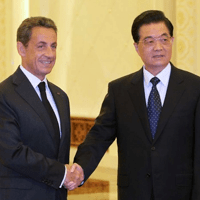Editor’s note: This is the second of a two-part series on the unlikelihood of a Chinese contribution to a financial bailout of Europe. Part I examined the domestic obstacles to a Chinese contribution. Part II examines the European obstacles to a Chinese contribution.
SHANGHAI -- Due to multiple ideological and practical obstacles, major Chinese participation in any European rescue plan would require significant material concessions from European leaders to gain any traction among Chinese policymakers and citizens. So far, proposed concessions have been largely symbolic, such as promises to recognize China's market economy status. Moreover, China prefers to deal either directly with national governments or in multilateral settings such as through the International Monetary Fund (IMF), rather than with the European Union. Far more tangible quid pro quos would be necessary to induce China to participate directly in any bailout package, and even indirect participation via an expanded IMF lending facility would require major adjustments to the European position.
The major reason Beijing prefers a country-by-country approach to European bond purchases, while pushing for multilateral action via the IMF or G-20, is that in both settings the demarcation of sovereignty is much clearer than at the EU level. As a result, Beijing feels that quid pro quos are easier to arrive at. The example of Sino-Italian relations neatly demonstrates Beijing's preferred trade-off of bond purchases in return for strategic investment access. Neither the European Central Bank (ECB) nor the European Financial Stability Facility (EFSF) are mandated to even discuss any such deal, and reaching consensus on China through other EU mechanisms has often proved complicated.

